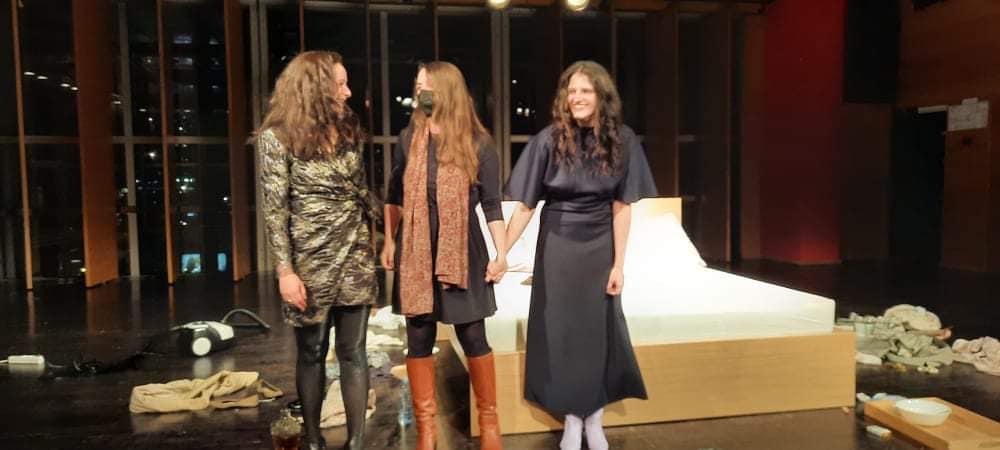Interview with the writer Rumena Buzarovska: The story is a form in which I am in love

After Skopje and Ljubljana, stories from the collection "My Man" by Rumena Buјотarovska are dramatized and staged on the theater stage of the Yugoslav Drama Theater in Belgrade.
The short prose works of the writer Rumena Buжаarovska have a long-term effect. Her collections of short stories have been published several times and translated into other languages. So far, he has published the collections "Scribbles" (Ili-Ili, 2007), "Osmica" (Blesok, 2010), "My husband" (Ili-Ili, 2014) and "I'm not going anywhere" (Ili-Ili, 2018). In addition to writing prose works and theoretical studies, Buzarovska is a professor, translator and women's rights activist.
Her collection of short stories "My Husband", six years after its publication, became relevant again, this time with adaptations for setting on the theater stage. Last year, plays with the same title were staged at the Drama Theater in Skopje and on the stage of SNG Drama in Ljubljana. Last week, on April 18, Rumena Buzarovska attended the premiere of the play "My Husband" staged at the "Studio" stage at the Yugoslav Drama Theater in Belgrade.
You had a very short and clear reaction after watching the third stage performance of "My Husband", this time in JDP. Immediately after watching the premiere, you wrote - Not that he is "My husband", but the girls in JDP broke up! Not as an author, but as a spectator, how did you see the play?
- It is difficult to distinguish between an author and a viewer, because I undoubtedly have subjective feelings towards my own texts. Fortunately, I think I am too critical, because I am afraid that someday the ideology of my stories will be disturbed, or some pathos will appear (I hate pathos and sentimentality). But, not only was there none of that, but the show was both very funny and touching, with very innovative and seemingly simple solutions. There were brilliant lines added to the dialogue that were perfectly timed, and the two actresses, Sanja Markovic and Jovana Belovic (young and relatively unknown until now), have incredible chemistry and power of transformation like I have never seen on stage. Honestly, this is one of the better acting performances I've seen in general. I cried laughing twice.

The dramaturgy of the play based on "My Husband" in JDP is signed by Dimitrije Kokanov and directed by Jovana Tomic. How does the Belgrade play differ from the previous two - in Skopje (Drama Theater) and in Ljubljana (SNG Drama)?
- The Belgrade show is chamber and intimate. The whole drama takes place on one bed - it is the only scenery - and is exclusively focused on the relationship of two women: mother and daughter, friends, neighbors, colleagues. The two actresses change several roles, transforming very convincingly and maturely (I am really delighted with the actresses, I will say it again), and in their acting and through their language, the class elements that are in the background of the text are captured. Although there are only two actresses in the scenery that does not change, the play is very dynamic, and its chamber lineup helps the audience to connect more emotionally with the stories.

The great theater director Slobodan Unkovski wrote a few days before the Belgrade premiere that after Rusomir Bogdanovski with the adaptation of "Einstein's Dreams" and Dejan Dukovski with "MME who started first", you are the third Macedonian author to be staged at JDP in just a few years. How do you feel in such a company?
- Before I say that I feel great in that company and I am very glad that I became part of a certain (post) Yugoslav cultural tradition, I want to mention that Slobodan Unkovski did not write such a status on Facebook, about the success of our art and culture abroad from the borders of the land no one would know. Unfortunately, I also have to use my Facebook wall to inform what is happening outside, and other artists and cultural workers do so in the absence of a national strategy that would highlight these things and use them for building and affirmation. of our culture. We have many other successes abroad (have we forgotten that Goce Smilevski, for example, was published by the renowned publishing house "Penguin"?), But if someone does not write on Facebook, it is rarely found out about it, and the national cultural institutions as a whole. not be interested in taking advantage of the situation at that time for further promotion.
Literary criticism, on the other hand, has placed you among the ten best writers in Europe for many years. The short stories obviously leave a deep impression. Is it the form that suits you best for writing?
- Me, yes. In a book, for example, I can put more stories and tell more stories, instead of focusing on just one who knows how to impose a dominant voice or worldview, as a novel does, for example. I see the story as a more democratic form of expression, because it gives space to more voices and phenomena. Of course, I also love reading novels, but my story is a form in which I am in love.
How long does it usually take to collect materials or write a new work? Is there anything new in sight?
- Usually three or four years after I wrote the previous book. In the meantime, of course, I write other things (I wrote several screenplays, for example, I wrote scientific texts and translated literary works) that allow me to delve deeper into some other issues, and also help me develop my style. Of course, I also need time to observe and collect stories, and I also need time to rest and move away from the previous book. Yes, I am doing something now, so I hope to have a new prose work in a year.
What is essentially related to your literary activity is the activism for improving the situation with gender relations in the society. How much literature and activism are involved and supported in your life?
- In my obvious lot, which is seen in my public appearances where sometimes it is forgotten that I am a writer, so I am treated as an activist. But I accept that because we have to talk about those things, and I use that position of mine to talk openly about gender issues, which have so far been completely neglected in public (and even now they are not considered important and we rarely see them processed on television space, for example). On the other hand, sometimes I feel a bit like a mascot, especially when my role is abused, and that happens when some rich centers of power (usually run by white men from the majority ethnic group) take advantage of this gender revolution, which occurs in the world for its own lucrative purposes. So, such people have approached me for collaboration, to tell me that, nevertheless, they ideologically disagree with what I write, and I know that they make fun of me and think that what I and other writers are doing now is just "Fashion" or "fake", not understanding anything we are talking about, thinking it is stupid because it is "feminine". But you see, they are still ready to take advantage of it. It is the lowest form of abuse that we as authors sincerely do, and it is also spitting and ridiculing the serious problems that women face. Femicide. Rape. Physical and emotional violence. Economic inequality.
What is it that initially gives you the initiation for a particular story?
- Very often it is a scene from everyday life that I have witnessed, and even more often it is a part of a story that someone told me. It is the capillary, and then around that certain scene I build characters, which I put in situations that I consciously knit in ways that I think will be effective for experiencing strong emotions or for coming to some knowledge.

What is it that most often revolts you about women's rights in society?
- Well, I talked above about that ridiculous attitude that revolts me, because it is essentially chauvinistic and violent. I am revolted by the phenomenon when a chauvinist most arrogantly reflects his own prejudices on the women's movement and makes you a fool in the face. Such nonsense is, for example, that women hated men (according to all experiences in history and in the present, given who is raped, beaten and killed, it seems that men hate women), that women ruled the world and now they have more rights (just look at who is in charge and who dominates all the political institutions and where the economic power is). Of course, then these views (a-la fake news) are reflected in the institutions and in how issues of gender discrimination are addressed there, and of course at all levels of society and even in the family. That is why we then have "public rooms" and femicides.
Given the situation in the Balkans, is there a need for the writer to introduce fiction in his works?
- Unfortunately, the real states of constant absurdity are very inspiring, but when you actually put them on paper, they are nothing special. Fiction is usually more effective, because it allows distancing and re-critical perception of reality.
It is very important for every author that his works be translated into other languages. Translation is also part of your profession. How satisfied are you with the translations of your works and what is your approach to translation?
- In the process, I additionally understand how important translation is and how much it can elevate or harm a work. Usually, when you are told that a work will be translated for you, you do not think that the translation can be bad, and it happens - and you as the author have no control over it. Such questions are often in the hands of publishers, who happen to choose the cheapest translation, which often also means poor quality. Fortunately, so far I have been mostly lucky with the translators. But in the last year I have also started translating my own short stories into English, in collaboration with translator Steve Bradbury (I met him in Iowa), who actually translates from Chinese to English and has just won the American PEN Award for Best Poetry translation. During the pandemic with Steve I listen at least 15 times a month for an hour; I will translate one to two pages into English, and then he edits and arranges the translation. He does not know Macedonian, so since I am here to ask me what I wanted to say in a certain place and what is my tone, say, he can convey the same more effectively in English. Working with Steve for so long I feel like I graduated from a new college. I then transfer that process to the translations that I do myself in Macedonian, and I see that the possibility of improving a certain text sometimes has no end. By the way, usually between my two books I intentionally aim to translate a literary work into Macedonian. There is no more substantial penetration into the style of a certain author than translation, there is no more thorough understanding and analysis of the content of a literary work than when it is translated. Translation also teaches a lot about one's own language and one is constantly confronted with one's own ignorance, which makes one more modest.
(The interview was published in "Cultural Press" No. 78, in the print edition of "Free Press" on April 24-25, 2021)


